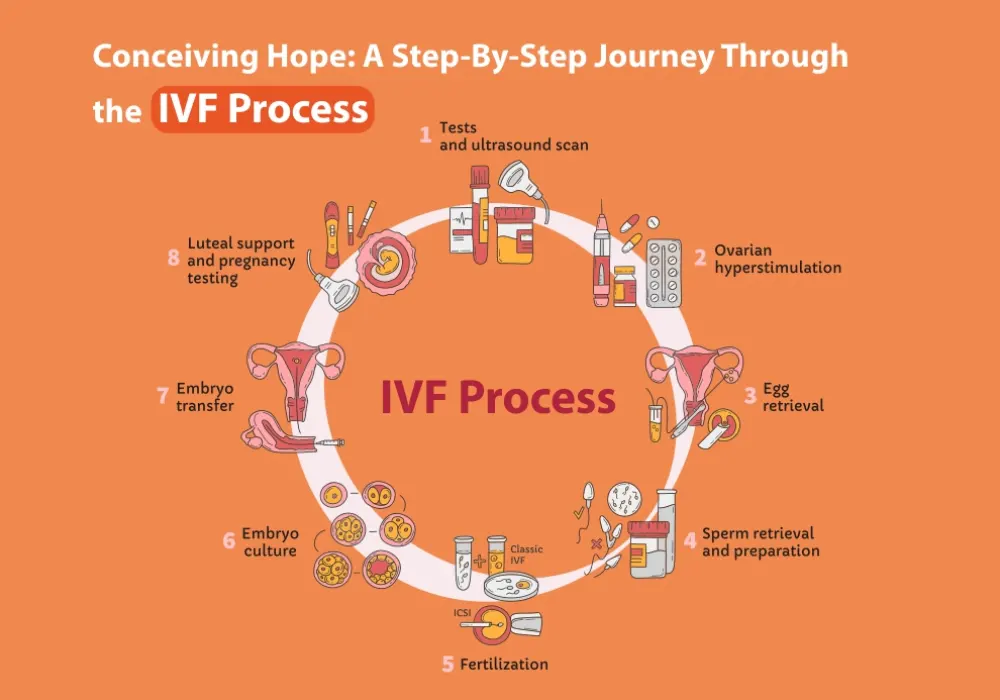Conceiving Hope: A Step-By-Step Journey Through the IVF Process
Assisted reproductive technologies have allowed many families to conceive a child. Over the past years, in vitro fertilization process or IVF has become an increasingly more popular process. It is widely applied for the treatment of infertility due to a variety of causes including blocked or damaged fallopian tubes, male factor, low ovarian reserve, or unexplained infertility.
IVF is a boon for childless couples. For couples facing infertility challenges where natural conception and pregnancy are not being possible, IVF often becomes the first option to explore. Also, it is considered a more successful technique than other assisted reproductive technologies. Babies conceived through the process are as healthy as babies conceived via natural pregnancy.
What is IVF?
During IVF, mature eggs are retrieved from ovaries and fertilized by sperm in a lab to form embryo. Then the embryo is transferred to a uterus. The IVF procedure can be done using a female’s eggs and husband’s sperm or may involve eggs, sperm, or embryos from a known or anonymous donor, as per medical indication.
The length of the IVF treatment can vary, but typically it takes about 4-6 weeks. It may be longer if additional procedures such as hysteroscopy, embryo freezing or genetic testing are involved.
Why is it done?
IVF may be an option if you or your partner has:
- Damaged or blocked fallopian tube
- PCOS or other ovarian conditions
- Problems with the uterus
- Endometriosis
- Uterine fibroids
- Impaired sperm production or function
- Unexplained infertility
- Poor egg quality/low egg reserve
- Advanced maternal age
- Recurring miscarriage
- Genetic disorder
Understanding the In Vitro Fertilization Steps
IVF is a complex process and involves many steps. This includes ovarian stimulation, egg retrieval, sperm retrieval, fertilization, embryo culture, and embryo transfer.
1. Initial consultation:
The process begins with an initial consultation with the fertility specialist. During the consultation, your medical history will be evaluated, and the doctor will discuss the potential causes of infertility and the suitability of IVF for your specific situation.
2. Ovulation induction:
The step involves the use of drugs to stimulate the growth of multiple follicles in the ovaries. These medications typically include follicle-stimulating hormone (FSH) and luteinizing hormone (LH). The progress of this process is monitored closely through regular ultrasounds and blood tests. This helps to determine the optimum time for egg retrieval.
3. Egg retrieval:
Egg retrieval is a critical step in the IVF process. During this procedure, the mature eggs are collected from the woman’s ovaries. This minimally invasive surgical procedure is performed under mild sedation or general anesthesia to minimize any discomfort for the patient.
A thin needle is inserted through the vaginal wall into the ovaries, and the eggs are aspirated from the follicles. The eggs are then placed in a culture dish. This step takes around 20-30 minutes and most patients can return home the same day, after complete recovery from anesthesia.
4. Sperm retrieval:
There are many ways to collect sperm for use in IVF, including masturbation, surgical extraction, and testicular sperm extraction. In cases there is a problem with sperm ejaculation, surgical extraction is used. This involves retrieving sperm directly from the testicles or epididymis using a needle or small incision. Sperms are then separated from the semen fluid in the laboratory.
5. Fertilization:
In the laboratory, the eggs and sperm are combined in a culture dish. Alternatively, a technique called intracytoplasmic sperm injection (ICSI) may be used if there are concerns such as low sperm count or poor sperm motility. ICSI involves injecting a single sperm directly into an egg to increase the chances of fertilization, and for formation of a good grade embryo.
6. Embryo development:
The fertilized eggs, now called embryos, are incubated in a controlled environment for a few days (3-5 days). The embryos are monitored for growth and development before being transferred to the uterus or frozen for future use. Embryo culture is a critical step in the IVF process and requires skilled technicians and advanced technology to increase the chances of a successful pregnancy.
7. Embryo transfer:
Typically, after two to six days of development, one or more embryos are selected for transfer. The chosen embryos are transferred to the woman’s uterus using a thin catheter that is inserted through the cervix. This procedure is performed without anesthesia.
After the embryo transfer, the woman is advised to rest for a short period before resuming normal activities. The embryos will hopefully implant in the uterine lining within a week.
8. Implantation:
The process is facilitated by hormone treatments, which help prepare the lining of the uterus for implantation. The success of implantation depends on the quality of the embryo, the receptiveness of the uterus, and the timing of the transfer.
9. Pregnancy test:
About two weeks after the embryo transfer, a blood test is conducted to determine if pregnancy has occurred. If the test is positive, further monitoring and care will be provided to support a healthy pregnancy.
10. Follow Up Visit & Tests:
Women who conceive through IVF may have a higher risk of certain pregnancy complications and may require regular monitoring. After a successful pregnancy, close monitoring and follow-up care help ensure a healthy pregnancy and delivery.
It’s important to note that the IVF process can vary depending on individual circumstances and fertility clinic protocols. The above steps provide a general overview, but the specifics may differ from case to case. It’s crucial to consult with an IVF specialist doctor in Gurgaon who can guide you through the procedure and address any specific concerns or questions you may have.
Watch Dr. Leena Yadav, IVF Expert at Miracles Fertility & IVF Clinic, explaining IVF Journey on our YouTube channel. (https://www.youtube.com/watch?v=x2TtQkytiAY)
What is the success rate of IVF?
The success of the procedure depends on many factors including the quality of the eggs and sperm, the patient’s age and overall health, and the expertise of the fertility clinic and doctors. If you are not getting pregnant despite your best efforts, contact the best IVF treatment centre in Gurgaon. Miracles Fertility and IVF Clinic is a state-of-the-art fertility center offering the latest fertility testing and treatment options. We provide compassionate care for individuals and couples looking to start a family. Our specialists have years of expertise in handling complex fertility cases.
To know more or schedule an appointment, please visit https://miracleshealth.com/ivf














Was the information useful?
0 0